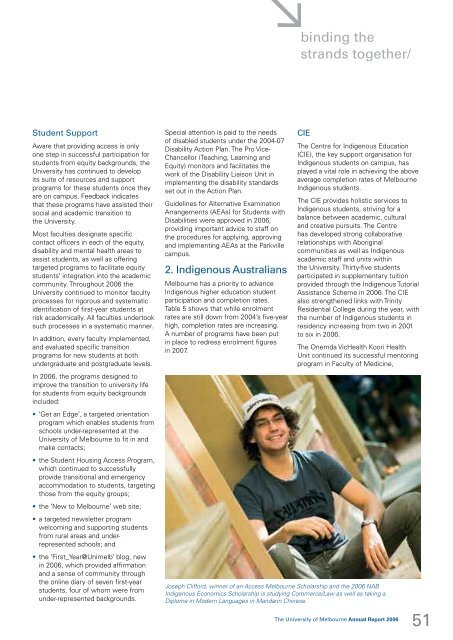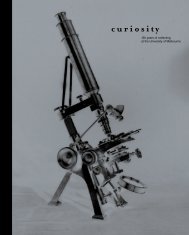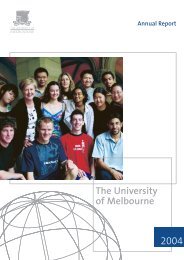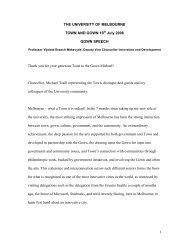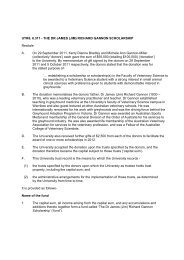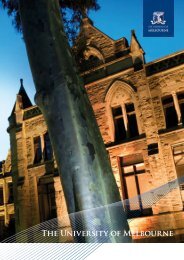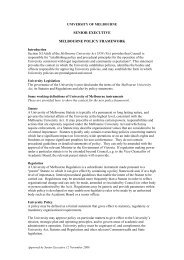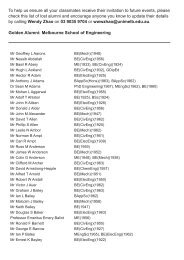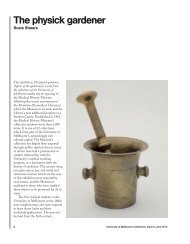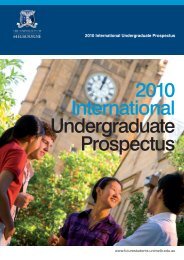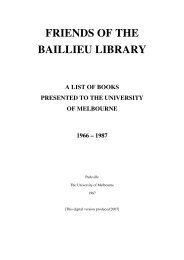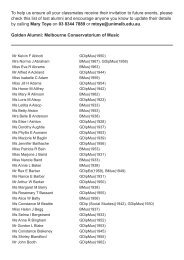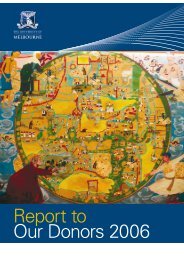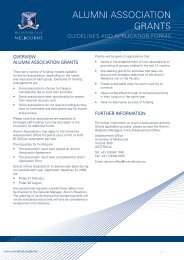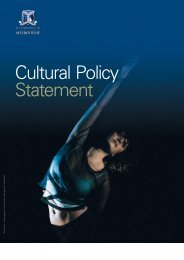annual report/2006 - University of Melbourne
annual report/2006 - University of Melbourne
annual report/2006 - University of Melbourne
You also want an ePaper? Increase the reach of your titles
YUMPU automatically turns print PDFs into web optimized ePapers that Google loves.
inding the<br />
strands together/<br />
Student Support<br />
Aware that providing access is only<br />
one step in successful participation for<br />
students from equity backgrounds, the<br />
<strong>University</strong> has continued to develop<br />
its suite <strong>of</strong> resources and support<br />
programs for these students once they<br />
are on campus. Feedback indicates<br />
that these programs have assisted their<br />
social and academic transition to<br />
the <strong>University</strong>.<br />
Most faculties designate specific<br />
contact <strong>of</strong>ficers in each <strong>of</strong> the equity,<br />
disability and mental health areas to<br />
assist students, as well as <strong>of</strong>fering<br />
targeted programs to facilitate equity<br />
students’ integration into the academic<br />
community. Throughout <strong>2006</strong> the<br />
<strong>University</strong> continued to monitor faculty<br />
processes for rigorous and systematic<br />
identification <strong>of</strong> first-year students at<br />
risk academically. All faculties undertook<br />
such processes in a systematic manner.<br />
In addition, every faculty implemented,<br />
and evaluated specific transition<br />
programs for new students at both<br />
undergraduate and postgraduate levels.<br />
In <strong>2006</strong>, the programs designed to<br />
improve the transition to university life<br />
for students from equity backgrounds<br />
included:<br />
• ‘Get an Edge’, a targeted orientation<br />
program which enables students from<br />
schools under-represented at the<br />
<strong>University</strong> <strong>of</strong> <strong>Melbourne</strong> to fit in and<br />
make contacts;<br />
• the Student Housing Access Program,<br />
which continued to successfully<br />
provide transitional and emergency<br />
accommodation to students, targeting<br />
those from the equity groups;<br />
• the ‘New to <strong>Melbourne</strong>’ web site;<br />
• a targeted newsletter program<br />
welcoming and supporting students<br />
from rural areas and underrepresented<br />
schools; and<br />
• the ‘First_Year@Unimelb’ blog, new<br />
in <strong>2006</strong>, which provided affirmation<br />
and a sense <strong>of</strong> community through<br />
the online diary <strong>of</strong> seven first-year<br />
students, four <strong>of</strong> whom were from<br />
under-represented backgrounds.<br />
Special attention is paid to the needs<br />
<strong>of</strong> disabled students under the 2004-07<br />
Disability Action Plan. The Pro Vice-<br />
Chancellor (Teaching, Learning and<br />
Equity) monitors and facilitates the<br />
work <strong>of</strong> the Disability Liaison Unit in<br />
implementing the disability standards<br />
set out in the Action Plan.<br />
Guidelines for Alternative Examination<br />
Arrangements (AEAs) for Students with<br />
Disabilities were approved in <strong>2006</strong>,<br />
providing important advice to staff on<br />
the procedures for applying, approving<br />
and implementing AEAs at the Parkville<br />
campus.<br />
2. Indigenous Australians<br />
<strong>Melbourne</strong> has a priority to advance<br />
Indigenous higher education student<br />
participation and completion rates.<br />
Table 5 shows that while enrolment<br />
rates are still down from 2004’s five-year<br />
high, completion rates are increasing.<br />
A number <strong>of</strong> programs have been put<br />
in place to redress enrolment figures<br />
in 2007.<br />
CIE<br />
The Centre for Indigenous Education<br />
(CIE), the key support organisation for<br />
Indigenous students on campus, has<br />
played a vital role in achieving the above<br />
average completion rates <strong>of</strong> <strong>Melbourne</strong><br />
Indigenous students.<br />
The CIE provides holistic services to<br />
Indigenous students, striving for a<br />
balance between academic, cultural<br />
and creative pursuits. The Centre<br />
has developed strong collaborative<br />
relationships with Aboriginal<br />
communities as well as Indigenous<br />
academic staff and units within<br />
the <strong>University</strong>. Thirty-five students<br />
participated in supplementary tuition<br />
provided through the Indigenous Tutorial<br />
Assistance Scheme in <strong>2006</strong>. The CIE<br />
also strengthened links with Trinity<br />
Residential College during the year, with<br />
the number <strong>of</strong> Indigenous students in<br />
residency increasing from two in 2001<br />
to six in <strong>2006</strong>.<br />
The Onemda VicHealth Koori Health<br />
Unit continued its successful mentoring<br />
program in Faculty <strong>of</strong> Medicine,<br />
Joseph Clifford, winner <strong>of</strong> an Access <strong>Melbourne</strong> Scholarship and the <strong>2006</strong> NAB<br />
Indigenous Economics Scholarship is studying Commerce/Law as well as taking a<br />
Diploma in Modern Languages in Mandarin Chinese.<br />
The <strong>University</strong> <strong>of</strong> <strong>Melbourne</strong> Annual Report <strong>2006</strong><br />
51


